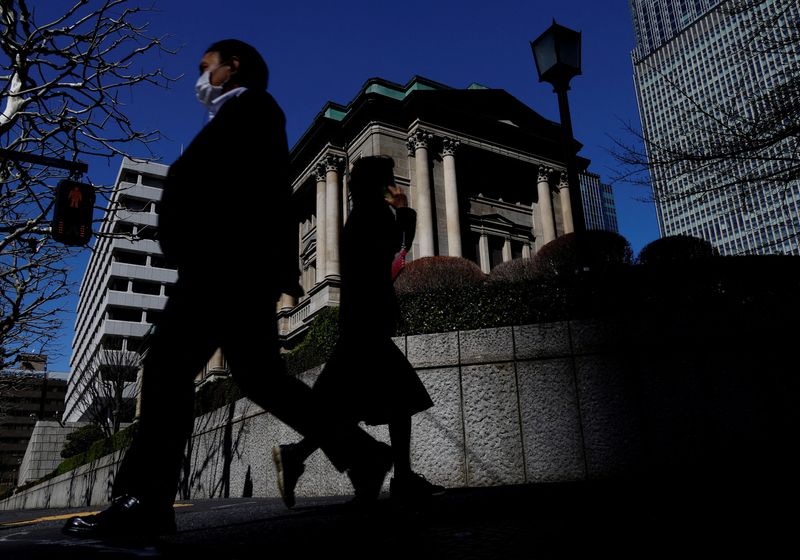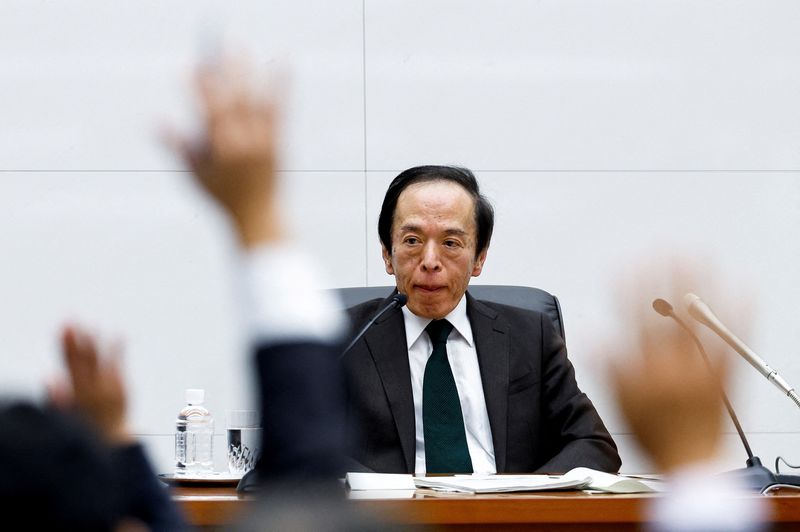By Leika Kihara
TOKYO (Reuters) -Bank of Japan Governor Kazuo Ueda said inflation would likely accelerate from "summer towards autumn" as bumper pay hikes push up prices, the Asahi newspaper reported on Friday, his strongest hint yet that another rate hike was possible in coming months.
The rare mention of an explicit timing drove two-year Japanese bond yields to their highest in more than a decade, helping the yen pull further away from the 34-year-low hit last week and providing some respite for policymakers worried about the economic effects of the currency's weakness.
In an interview with Asahi, Ueda said the central bank could "respond with monetary policy" if currency moves significantly drive inflation and wages, suggesting sharp yen falls could affect the timing of the next rate hike.
"We ended our massive stimulus programme because we saw prospects for trend inflation to approach 2% come into sight. If we become more confident about such prospects, that will be one reason to move interest rates," Ueda was quoted as saying.
"Sustainable and stable achievement of our 2% inflation target is coming into sight. The possibility of achievement is expected to increasingly heighten," he said, according to Asahi's interview that was conducted on Wednesday.
On Friday, Japanese Finance Minister Shunichi Suzuki also waded in with fresh currency warnings, telling reporters that authorities won't rule out any options to deal with excessive yen falls.
The yen hit a two-week high and Japan's two-year government bond yield rose to 0.21%, its highest in 13 years, as markets priced in the chance of an earlier-than-expected hike in Japan's borrowing costs.
Ueda told Asahi he expected inflation to pick up "from summer towards autumn" as wage increases begin to give households purchasing power.
The comments highlight the BOJ's conviction that rising wages and inflation will help make the case for hiking short-term rates from the current 0-0.1% level as soon as July.
"As priced in by markets, another rate hike by around autumn is becoming a realistic scenario," said Naoya Hasegawa, chief bond strategist at Okasan Securities.
"An additional rate hike in October-December is now on the cards. But given how Ueda mentioned prospects for achieving 2% inflation will 'increasingly heighten,' there might be a chance of a hike in July-September," analysts at SMBC Nikko Securities wrote in a research note.
When asked whether the BOJ could raise interest rates this year, Ueda said it was "dependent on data" and how much progress Japan makes toward sustainably achieving the bank's 2% inflation target, according to Asahi.
The BOJ releases fresh quarterly growth and inflation forecasts at its next meeting in April 25-26. Its board also holds rate-setting meetings in June, July, October and December.
YEN COMPLICATES RATES
The BOJ ended eight years of negative interest rates and other remnants of its unorthodox policy last month, making a historic shift away from its focus on reflating growth with decades of massive monetary stimulus.
A Reuters poll taken shortly after the March move showed more than half of economists expecting another rate hike this year, with October-December the most popular bet on the timing.
Data since then has been mixed with consumption and output showing weaknesses, but the wage outlook continuing to improve.
Japanese firms agreed to raise wages 5.24% this year, the highest increase in 33 years, according to a survey by labour umbrella Rengo released on Thursday.
The BOJ said in a report released this week that wage hikes were broadening to smaller firms in regional Japan, prodding firms to pass on labour costs through price hikes.
However, the weak yen complicates the BOJ's policy path.
While declining to comment specifically on the yen's recent declines, Ueda signalled in the interview that such moves could serve as a reason to raise interest rates if they push up inflation via higher import costs.
"If exchange-rate developments appear to have an impact on Japan's wage-inflation cycle in a way that's hard to dismiss, that would be a reason to respond with monetary policy," Ueda said.
The yen has been on a downtrend despite the BOJ's exit from ultra-loose policy, as traders interpreted its dovish language as signalling the next rate hike would be some time away.

A weak yen has become a source of headache for Japanese policymakers as it inflates the cost of importing raw material and fuel, thereby hurting households and retailers.
Adding to those headwinds, an index measuring the health of Japan's economy published on Friday fell for the second straight months in February, a sign growth may have peaked and is now headed for a downtrend due to slumping factory output.
